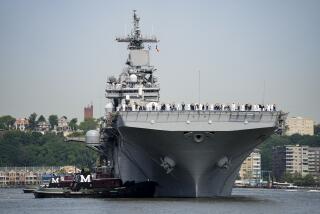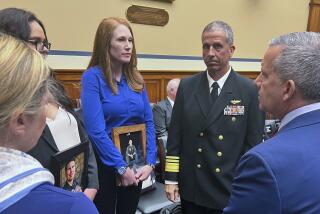Navy Halts Missile Use in Wake of Turkish Deaths
WASHINGTON — The Navy ordered a temporary halt in use of the Sea Sparrow missile Saturday, two days after an accident involving the weapon killed five Turkish sailors and injured 13 others in NATO maneuvers.
Military officials usually suspend operation of a weapons system after an accident believed to have been caused by a technical malfunction. The Navy’s decision was a surprise because it indicates that early suspicions about the cause of the accident, which had focused on the possibility of human error, have widened to include possible mechanical problems.
Adm. Frank B. Kelso, chief of naval operations, also ordered the Navy’s sea systems commander, Vice Adm. Kenneth C. Malley, to direct a “top-to-bottom review” of the Sea Sparrow system, including its hardware, maintenance and launch procedures, and operational training.
“The United States Navy has operated the Sea Sparrow missile system for more than 17 years without any known mishap of this nature,” the Navy said in a statement released Saturday. “Nevertheless, Admiral Kelso has directed these actions as prudent measures to ensure there can be no recurrence.”
The order suspending use of the Sea Sparrow will affect dozens of U.S. warships that rely on the weapon as a defense against sea-skimming missiles or fast-attack vessels. Two missiles were accidentally fired from the U.S. aircraft carrier Saratoga during a night naval exercise in the Aegean Sea on Thursday, one of them striking the Turkish destroyer Muavenet.
The suspension comes at a particularly inopportune time for the Saratoga because the ship is expected to be ordered to duty off the Balkan Adriatic coast in the coming weeks. The suspension can be waived in cases of operational need, however, and would probably be set aside for the Saratoga if the vessel is assigned to help enforce a “no-fly” zone over Bosnia-Herzegovina, officials said.
A Navy board of inquiry, composed of three admirals, began an investigation aboard the Saratoga on Saturday and is expected to report its findings before the end of the year.
More to Read
Sign up for Essential California
The most important California stories and recommendations in your inbox every morning.
You may occasionally receive promotional content from the Los Angeles Times.











